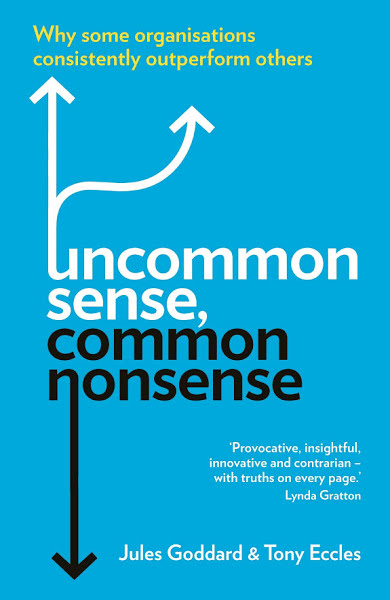Uncommon Sense, Common Nonsense:
Why Some Organizations Consistently Outperform Others
By Jules Goddard and Tony Eccles
Published 2012
ISBN: 9781846686023
–Review by Douglas Balzer
Being drawn to books with unusual titles has been one of my patterns. For me, the attraction is the Common Nonsense factor of the title of this book through the book does provide and deliver Uncommon Sense. My interest was peaked with the idea in combination with my personal experiences with others in various contexts witnessing the nonsensical actions of people. The takeaways from this book are significant for the church, and it’s leadership in the 21st century. It reminded me of Jesus’ uncommon sense to the common nonsense he engaged when he walked amongst us. Jesus was intelligent and penetrating about the cultural and religious environment he directly interacted with giving us the example of how to engage the culture with our presence as his church. So, I am going to touch on some significant takeaways for your consideration and invite you to purchase the book for further study.
The first and primary take away deals with the ideology of the ineffectiveness of having a uniform template for success. Trying to use the formulation of another does not offer or guarantee success, here is a common nonsense issue. You would think we would get this by now, but many are presenting their templates as a uniformed way to revitalization. Instead, what the authors have found is winning, or successful growth requires specific intelligence about the culture environment and execution. The need for a specific cultural environment is intuitiveness and perception to generate strategy; what the authors suggest is rules and ideologies do not work. Churches and business should be considered the fluidic nature of culture and respond through intuition and perception.
“Strategic solutions do not generalize. They are built on insights, not rules or principles. Insights are small-scale, often short-lived discoveries. Something is noticed that had not been seen before.”
The next takeaway is the value of entrepreneurship or the pursuit of something new and different. Being an entrepreneur means going against the grain and ignoring your critics. The issue of criticism is where attention is giving and listening to the criticism solely and taking it to heart kills innovation. When leadership gets 50 reviews, and 3 out the batch are negative the focus goes to the lesser and ignores the 47 positives. More common nonsense directing the actions of the leadership so, the results are a decline in innovation, and the resulting uncertainty that leads to conformity. Instead, shoot for being distinctive rather than trying to be better than the competition. The common nonsense is the endorsement of entrepreneurship yet not making a personal change to make it actionable.
Third, best practices are dangerous. I ruminated on this one for a while because of the popularity of the ideology. I wanted to be sure I understood what the authors were saying. So, understanding why best practices are dangerous is because you can’t achieve fresh excellence by applying the same old formulas. The uncommon sense is recognizing how best practices perpetuate conformity and discourage innovative and original thinking. Anyone who subscribes to best practices ends up following predictable patterns that give rise to the ordinary rather than to the extraordinary. The common nonsense is the perspective that best practices promises extraordinary results when it does exactly the opposite. It can lead to the loss of the strategic edge being sought.
“To emulate best practice is to abandon any pretense to original thinking. It is simply plagiarism on an industrial scale.”
“The concept of best practices is perhaps the single most value-destructive idea to have come out of business schools and management consultancies over the past 20 years.”
Often it is thought the diminishment of the church is due to external circumstances, but the reality is external circumstances rarely cause the failure of a business or church. More often failure is because of what happens inside a church or business. Leaders and congregants do not recognize and acknowledge strategic errors or cultural issues. It has to deal with willful blindness and limited perspective. Having an effective strategy is the product of intuition and spontaneity, not predictability. Locking into predictability leads to a death spiral. The uncommon sense is to encourage daring thinking, risk-taking, and action, not predictability. Combine this with the ability to take responsibility and accept the inevitability of mistakes and errors allows for realistic thinking rather than safe zone thinking.
“Artists and poets have a lot to teach strategists. They understand creativity cannot be hurried.”
The authors present clear comparisons between the common nonsense accepted as an effective theory for an approach to culture and business with the uncommon sense leading to insightfulness, innovation, and execution. Now, in closing here is a quote from the authors.
“Strategic ideas, because they are generally contrarian, invite incredulity when first expressed. Only much later, if the idea works, does everyone claim to have always been a fan.”

